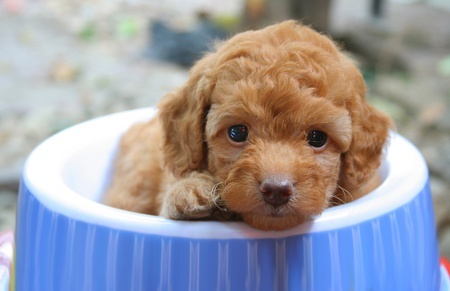Getting a new puppy is an exciting time for the whole family! There are many things you need to do in preparation for this new family member, including purchase food, bowls, toys, a bed and more. One very important part of your puppy preparations is puppy-proofing your home. Puppies are extremely inquisitive and love to chew. Follow these tips to keep your new puppy – and home – safe!
Chewing
Puppies are like teething infants and will chew anything they can get ahold of, including electric cords! Before bringing home your puppy, tuck all electric cords out of the way or tape them up. Also, look around your home and put away anything the puppy could reach and potentially swallow. If you have children, explain to them that the puppy could be hurt by chewing toys that have been left out and get them in the habit of putting away their toys after play.
Chemicals/Poisons
Before you get your puppy, be sure to remove all poisons and put them somewhere that the puppy cannot possibly reach them. Dogs are attracted to the smell and taste of poisons like rat, ant, and snail bait. Also make sure your household cleaners and chemicals are stored somewhere your puppy will not be able to get into. Anything that would be harmful for a child to ingest will be harmful for your puppy too!
Food
Never change the diet of new puppy and do not add snacks that your puppy is not already eating. Changing your puppy’s diet or giving them too many treats will lead to intestinal upsets. Talk to your breeder or veterinarian before making dietary changes, and call if your puppy experiences any food related problems.
Fencing
In the yard, it is best to dig down 8″ and install wire below your fences so that the puppy cannot get out, or a neighbor dog dig under and come in the yard. This will keep your puppy safe at home. Even with this fencing installed, never leave your young puppy in the yard alone. Stay outside with them while they go to the bathroom or play to make sure they do not get into anything.
Things to Remember
Remember, your new puppy is like a infant. It needs to be kept warm, have access to food and water all day, and get plenty of rest. It is important to give your puppy quiet time to sleep. If you have children, explain that your new puppy is like a baby and needs plenty of naps to stay healthy.
While places like the pet store and dog park are a lot of fun for young dogs, do not take your puppy to places frequented by dogs you do not know until it has had its last puppy booster shot at 16 weeks. This will keep your new puppy safe from parasites and other diseases that can be passed from other dogs.
Always register the microchip that your puppy comes with and if your puppy does not come microchipped, be sure to have this done at the vet. For more information on microchipping your new pet, check out our recent post: Microchip Your Dog.




Leave a Reply
You must be logged in to post a comment.